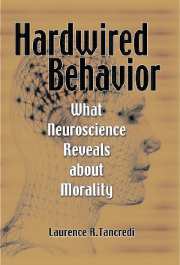Book contents
- Frontmatter
- Contents
- Preface
- Acknowledgments
- 1 Neuroscience and Morality
- 2 Morality and the Mind
- 3 Beyond the Mind Zone
- 4 The Moral Brain
- 5 Bad without Conscience
- 6 The Biology of Choice
- 7 Sex and the Single Moral Code
- 8 Brain Biology and Sex
- 9 Deception
- 10 The Biology of Money
- 11 The Bad and the Mad
- 12 Creating a Moral Brain
- Notes
- Glossary
- Index
Preface
Published online by Cambridge University Press: 13 October 2009
- Frontmatter
- Contents
- Preface
- Acknowledgments
- 1 Neuroscience and Morality
- 2 Morality and the Mind
- 3 Beyond the Mind Zone
- 4 The Moral Brain
- 5 Bad without Conscience
- 6 The Biology of Choice
- 7 Sex and the Single Moral Code
- 8 Brain Biology and Sex
- 9 Deception
- 10 The Biology of Money
- 11 The Bad and the Mad
- 12 Creating a Moral Brain
- Notes
- Glossary
- Index
Summary
My intention in writing this book has been to generate discussion about the findings of neuroscience research over the past few decades and their possible effect on our understanding of humankind's moral precepts. Extraordinary advances in neuroscience have accelerated the breakdown of the idea that a dichotomy exists between mind and body. This erosion of a long-standing belief has many implications for the medical treatment of neurological and psychiatric illnesses. Not least, it forces us to reexamine basic notions concerning the human condition and our construct of morality.
Our focus is shifting from an emphasis on mental processes – particularly the strong emphasis on free will and intentionality – to recognition of the very important role of the physical brain on human thought and behavior. We are learning that social morality begins in the brain, for without the brain, there would be no concept of morality; the brain allows for interaction among individuals within the community, and this interaction leads to the construction of a framework for moral order. Individual responsibility, therefore, must be reconsidered in the light of biological brain processes, which may under certain conditions exert a deterministic influence.
The events of 9/11, the abuse of Iraqi prisoners by American soldiers, the uncontrollable sexual desires and greed of some members of society who infract the rights and personhood of others – these are among the many examples of “moral” or “immoral” behaviors that have captured the attention of the public over the past decade.
- Type
- Chapter
- Information
- Hardwired BehaviorWhat Neuroscience Reveals about Morality, pp. ix - xiiPublisher: Cambridge University PressPrint publication year: 2005



